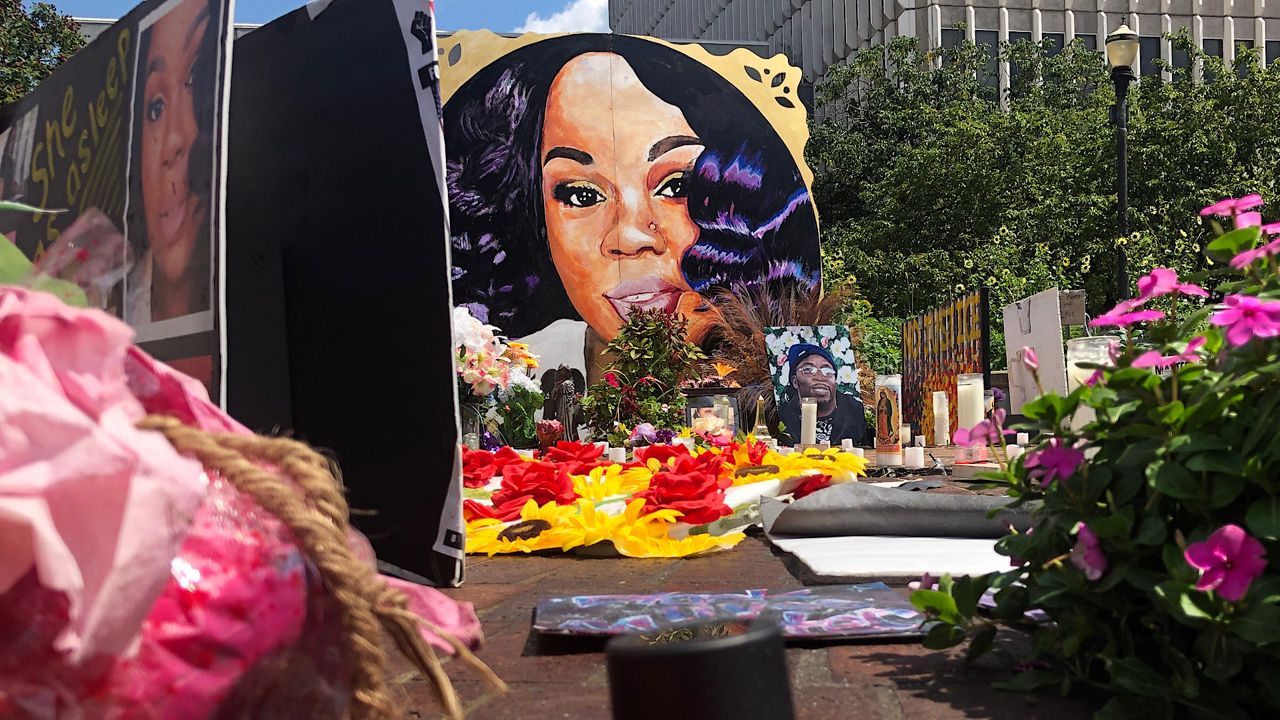LOUISVILLE, Ky. — On the afternoon of May 28, more than two months after police shot and killed Breonna Taylor in an overnight raid of her home, a lawyer for her family released a 911 call from her boyfriend, Kennth Walker. With no video of the incident, Walker’s frantic and frightened call provided the closest, and rawest look at what happened on the night of March 13. Within hours of the call’s release, the streets of downtown Louisville swelled with protesters. They’ve hardly left since.
Friday, Sept. 4 marks the 100th consecutive day of protests in Louisville. Over the past three months the number of people in the streets has ebbed and flowed, and the scope of their cries has grown. In the early days, protesters calling for the arrest of the officers who killed Taylor also chanted the names of George Floyd, killed by Minneapolis police in May, and Ahmaud Arbery, murdered by vigilantes in Georgia in February. Soon other names joined theirs, including David McAtee, killed by Kentucky National Guard members in June, and Tyler Gerth, killed in Jefferson Square Park in July.
Through it all, a core group has gathered at the park at 6th and Liberty, dubbed Injustice Square Park by those who keep the flame of protest alive there each day. Others have carried the fight for racial justice and police reform to Metro Hall, the food deserts of Louisville's West End, and the internet. To mark the 100th day of protests in Louisville, Spectrum News 1 spoke to five people who have fought for, and in some cases already won, justice in Breonna Taylor’s name.
Parrish-Wright, who works for the Louisville Bail Project, has been a mainstay at Jefferson Square Park since the protests began, providing food, water, and other support to those occupying the space.
“The people are united across our city, county, state and nation and WE want those officers FIRED, arrested and prosecuted. From the ‘hood to the holler’ we are sick and tired of police abuse and police brutality. We have never had 100 days standing together, people from all walks of life, focused, shaken and stirred, but ready to do what it takes to bring justice in every way we can.”
When the Kroger at 26th and Broadway closed after David McAtee’s killing, Martin went to work feeding people. She has served thousands of meals at dozens of sites around the West End in the past three months and is now aiming to do more, with plans to open a permanent grocery store, Black Market KY., later this year.
“I will never forget the sound of Kenny Walker's voice on that 911 playback when he begged for someone to help him save Breonna — his unanswered cries pull at me everytime I say her name and every time I protest. Justice for Breonna Taylor looks radically different than what stale politicians like Greg Fischer are willing to advocate for; it amounts to defunding the police so Black folks can finally get reparations in this stolen land.”
Among the constants at downtown Louisville demonstrations is a group of livestreamers who provided unfiltered and uncut coverage of what’s happening on the ground. Mitchell, who streamed Tyler Gerth’s shooting, is one of them.
“It makes me feel reassured that no matter what we go through as individuals that people still care about this cause, this movement. It makes me feel that people believe in the power of consistency. It is so encouraging dealing with different personalities coming together with different backgrounds and viewpoints coming together for this!”
When others took to the streets in early June, Herron went to work on changing policy. And on June 11, two weeks after the protests in Louisville began, she helped the movement win a major victory with the Metro Council's unanimous approval of Breonna’s Law, which banned the type of no-knock warrant police used to enter Taylor’s apartment.
“Centuries of racial injustice have been laid bare in Louisville and throughout the nation. Our leaders can no longer ignore the lived realities of Black and Brown people. To create meaningful change moving forward, we must see the humanity in people and confront the uncomfortable issues that are at the root of our problems, instead of putting a band-aid on the rotten fruit growing at the surface.”
A self-described “concerned citizen” seeking justice for Taylor and “any other oppressed person,” Crittenden has participated in actions meant to both go viral and inform, including the Black Lives Matter Louisville protest in NuLu in late July.
“On one hand, yes, it’s beautiful and empowering to see people (of all backgrounds) come together and stand up to a corrupt and broken system. Yet on the other hand, it’s exhausting we’re still fighting the same fight for justice our grandparents were, to seemingly no avail. It’s also disheartening to see that now that social media posts have been made, a lot of people are forgetting that there’s still grassroots work to be done. I am optimistic though. I can feel my ancestors flowing through my entire existence. I know we can carry the torch of justice further than they could, we just have to continue to mobilize and organize strategically.”



